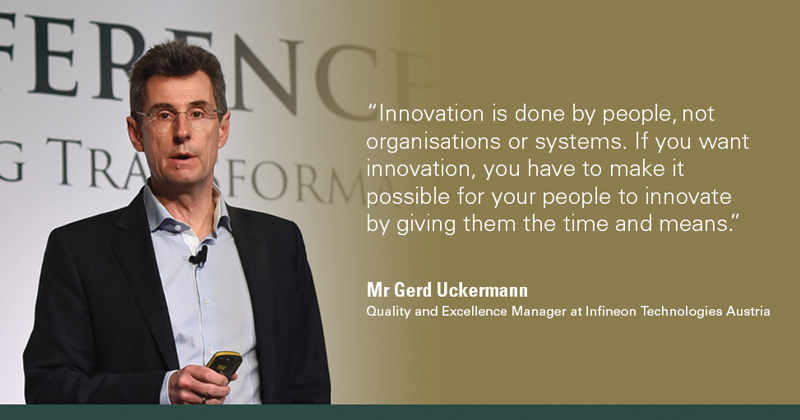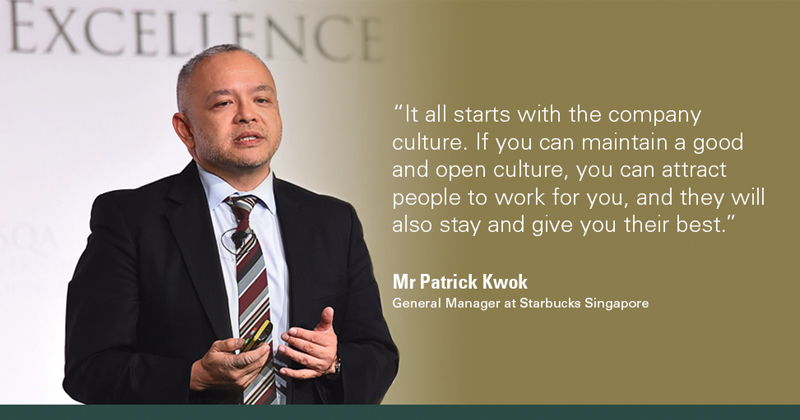This is the second post of a three-part series on Business Excellence. For the third post, click here.
Companies that want to foster a strong innovative working culture have to set aside the time and resources for their employees to think creatively and try new methods, and allow for the possibility of failure. This was advice given by several speakers at the Business Excellence Conference 2019 jointly organised by Enterprise Singapore and the Singapore Quality Award Governing Council.
“Innovation is difficult but necessary if you do not want to fall behind your competitors. The important thing to remember is that innovation is done by people, not organisations or systems. You have to give your people opportunities to be innovative, give them the time and means, and praise them if they succeed,” said Mr Gerd Uckermann, Quality and Excellence Manager of electronics firm Infineon Technologies Austria.

In his talk, which was titled “Building a Culture of Innovation”, he noted that even failed ideas can teach companies valuable lessons. “At Infineon, we give out an award called the ‘Learning Award’ to emphasise that even if you try something and fail, as long as you learn something from the experience, it was worthwhile,” he said.
How to empower employees
To spark ideas, companies should also encourage employees from different departments to mingle and talk to one another regularly. “You should bring together people with the same interest and expertise but who have different roles or are working on different projects, as they may be able to help one another,” said Mr Uckermann.
Cross-functional gatherings are also important, for example between the research and development department and the sales and marketing team, so that the former can learn more about customers’ needs while the latter can better understand products in the pipeline.
“You should also invite your customers to talk to you and bring academics from universities to your site to see if anything can be improved,” recommended Mr Uckermann. “Every week, we also have a talk by one of our technical experts which anyone can join and where anyone can ask questions.”
Senior executives also need to play their part by keeping track of market trends and evaluating the company’s work regularly to see if it is fit for the future.
“If you want to build a culture of innovation, you must have a management system that values it. One of the most important steps that we took was to introduce the role of an innovation manager and have him high up enough in the hierarchy so that he has the freedom to do his work, to really look and have a broad view of how we can be innovative,” said Mr Uckermann.
How to build an open and strong company culture
To embolden employees to share their ideas and feedback, an open-door policy at the management level is also vital. Mr Patrick Kwok, General Manager at Starbucks Singapore, said that the firm practices open communication, and managers as well as more senior staff often meet with frontline staff, their teams and cross-functional teams. “We have one-to-one meetings before moving on to smaller group meetings and then finally larger ones. To understand our people’s needs, celebrate their success and get insights for improving our organisation are the purposes of the meetings,” he said.

When a new idea or plan is ready to be implemented, employees at every level, from senior management to operations leaders to all retail are given enough time to prepare for it, communicate it to their store teams, train the partners and request for additional resources if needed, said Mr Kwok.
Starbucks also cultivates a lively and positive work culture by giving employees flexibility in their uniforms and encouraging them to be themselves. The company also has conversation-style quarterly performance and development reviews that avoid ratings systems, and constantly motivates them through a variety of means, including weekly coffee tasting sessions to chat and share about their challenges, quarterly celebrations, writing them a card if they do something well.
He noted that such measures to empower and motivate employees are crucial to creating and retaining strong teams in the company. He said: “It all starts with the company culture. If you can maintain a good and open culture, you can attract people to work for you, and they will also stay and give you their best.”
Companies can build an innovative culture by making business excellence a priority, and they can get help to do so through Singapore’s Business Excellence initiative, which marks its 25th year this year.
This is the second post of a three-part series on Business Excellence. For the third post, click here.

